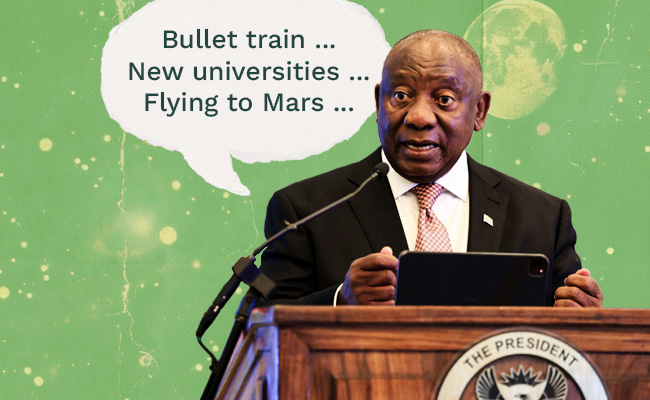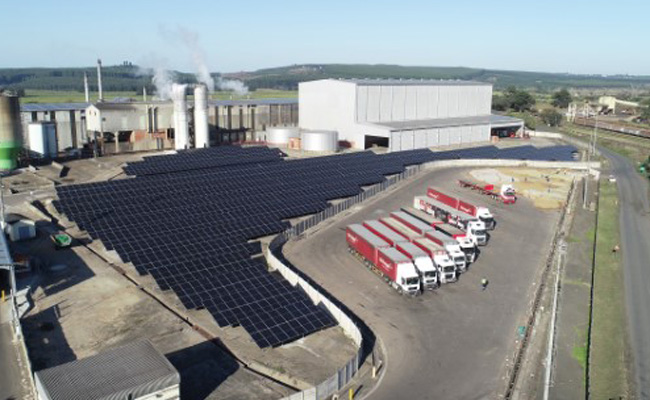From goings-on in politics to info drops in the economic world, we’ve got you covered on what to expect this week.
Politics
Madlanga commission
Three more witnesses will present testimony in camera between Monday and Wednesday. Justice Mbuyiseli Madlanga confirmed that the evidence of one of the three witnesses will be heard remotely and off camera. The answers of the witness will be repeated publicly through an intermediary. The remaining two witnesses will not testify through intermediaries and their answers will be broadcast live.
Madlanga said that the evidence leaders will not look to lead other witnesses in camera without a new application to the commission. The evidence leaders will also need to make any new applications publicly known at least 72 hours before a witness is called to testify.
Dion George to host national stakeholder consultation
Forestry, fisheries and environment minister Dion George and Crispian Olver, deputy chair of the Presidential Climate Commission, will host the COP30 national stakeholder consultation on Monday in Joburg. The 30th Conference of Parties (COP30) will be held in Brazil in November.
The goal of the consultation is to consolidate South Africa’s position for climate change negotiations and raise public awareness around climate change. It will be attended by various stakeholders including representatives from business, youth formations, labour, civil society and representatives from the South African Local Government Association.
KZN political killings probe continues
This week’s parliamentary inquiry opens with the suspended police minister, Senzo Mchunu, still fighting for political survival as testimony around the disbanding of the KwaZulu-Natal political killings task team continues. The inquiry resumes on Tuesday, with roughly two hours reserved for questions after housekeeping, before rolling into Wednesday to play and test the audio recording Mchunu cited about alleged “fight-back” threats. The calendar then tightens: former police minister Bheki Cele is slated for the stand on Thursday and Friday as the fifth witness.
The task team’s fate has become a bit of a proxy for the government’s capacity to confront political violence and protect whistleblowers. Any wobble in Mchunu’s version will land on the presidency. “Keeping Mchunu is critical for the ANC, as their biggest single voting block is in his home province of KwaZulu-Natal,” says ex-ambassador Melanie Verwoerd. Even so, Mchunu now appears more of a liability than asset to the president.
US trade deal sprint
Time is now running out for South Africa to land a stop-gap US trade deal. The African Growth and Opportunity Act (Agoa) agreement lapsed at the end of September, and officials had talked up October as the window to finalise a replacement. Last week, trade, industry and competition minister Parks Tau said the sides were “very close”, but with days left in the month the clock is the headline. The US government shutdown is poor timing. It slows sign-offs across departments even if negotiators have a near-final text.
Details are likely to include targeted tariff relief and quotas for priority sectors, with clearer reporting and checks. A simple snap-back rule could be part of the package. Markets will watch for early-week signals; by late week, authorities could move to announce terms, seek cabinet sign-off, or issue guidance if the text is ready.
Economics
Consumer price inflation
Stats SA’s September CPI release lands on Wednesday at 10am. Headline inflation is likely to rise 0.2% month on month after a -0.1% month-on-month decline in August, as a slower drop in fuel costs and firmer food prices offset softness elsewhere. Over the month, Brent crude oil increased about 1% and the rand appreciated roughly 1.8% against the dollar. Together, that translated into a smaller petrol price decline of about -0.2% month on month versus -1.3% month on month previously. Consequently, the year-on-year decline in the petrol price narrowed to 2.3% from 5.7%.
Food prices are likely up 5.3% year on year from 5.2% year on year, driven by double-digit meat inflation linked to the foot-and-mouth outbreak. Housing and utilities should add a touch more in areas such as rentals, owners’ equivalent rent, domestic-worker wages, and public-transport fares, as surveyed in September. Core CPI is likely steady near 3.1% year on year.
SARB’s monetary policy review
The South African Reserve Bank’s monetary policy review is due Thursday, and is likely to keep a steady tone. With core CPI likely near 3.1% year on year and headline pressure shaped by fuel and food, the bank will probably note contained underlying inflation while flagging risks. Geopolitical headwinds such as oil-market jitters and China-US tensions could complicate the outlook even with a firmer rand.
Petrol deflation is narrowing on a year-on-year basis. Food risks remain skewed by disease-driven meat costs. Administered prices and transport remain watch-points. Policy guidance is likely to frame current settings as appropriate while keeping options open, anchoring expectations, and signalling that a long-term disinflation trend, not one print, will guide their next move.

This article is published courtesy of The South Africa Brief, a political newsletter published on Substack which is a collaboration between Paul Berkowitz and Jonathan Moakes. It provides analysis and insight into the new, uncertain era of South African politics heralded by the 2024 general election. Including a specific focus on municipal politics, it will provide full analysis in the run-up to next year’s municipal polls.
Top image: Rawpixel/Currency collage.
Sign up to Currency’s weekly newsletters to receive your own bulletin of weekday news and weekend treats. Register here.











